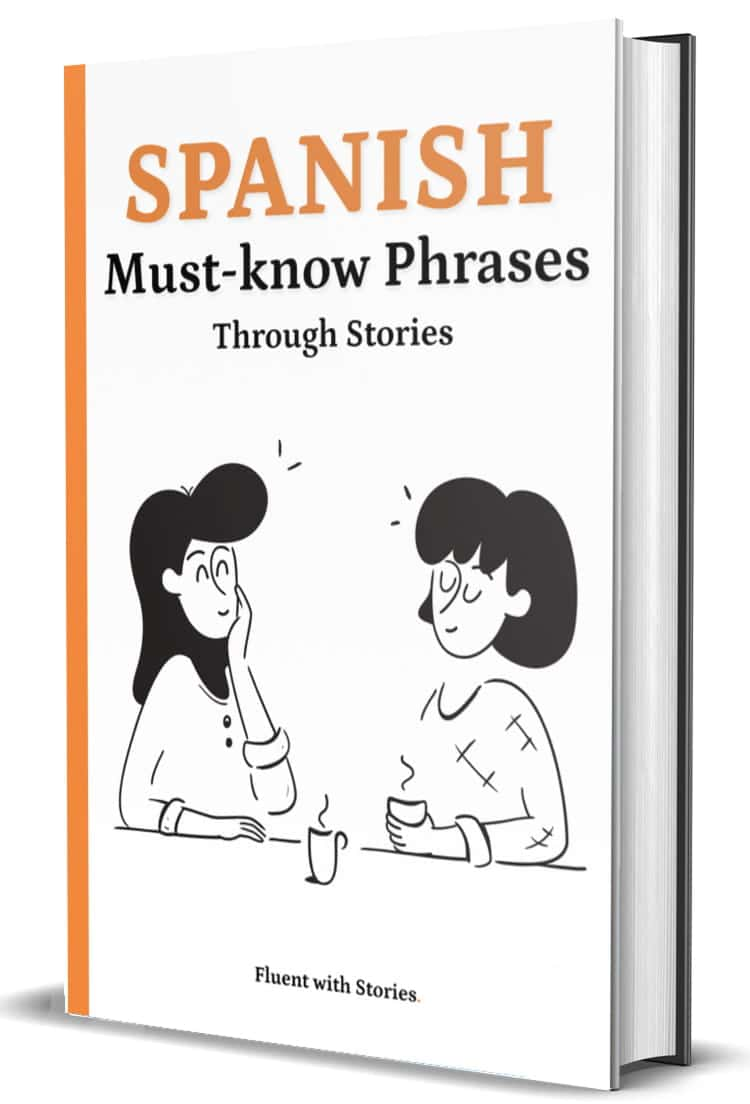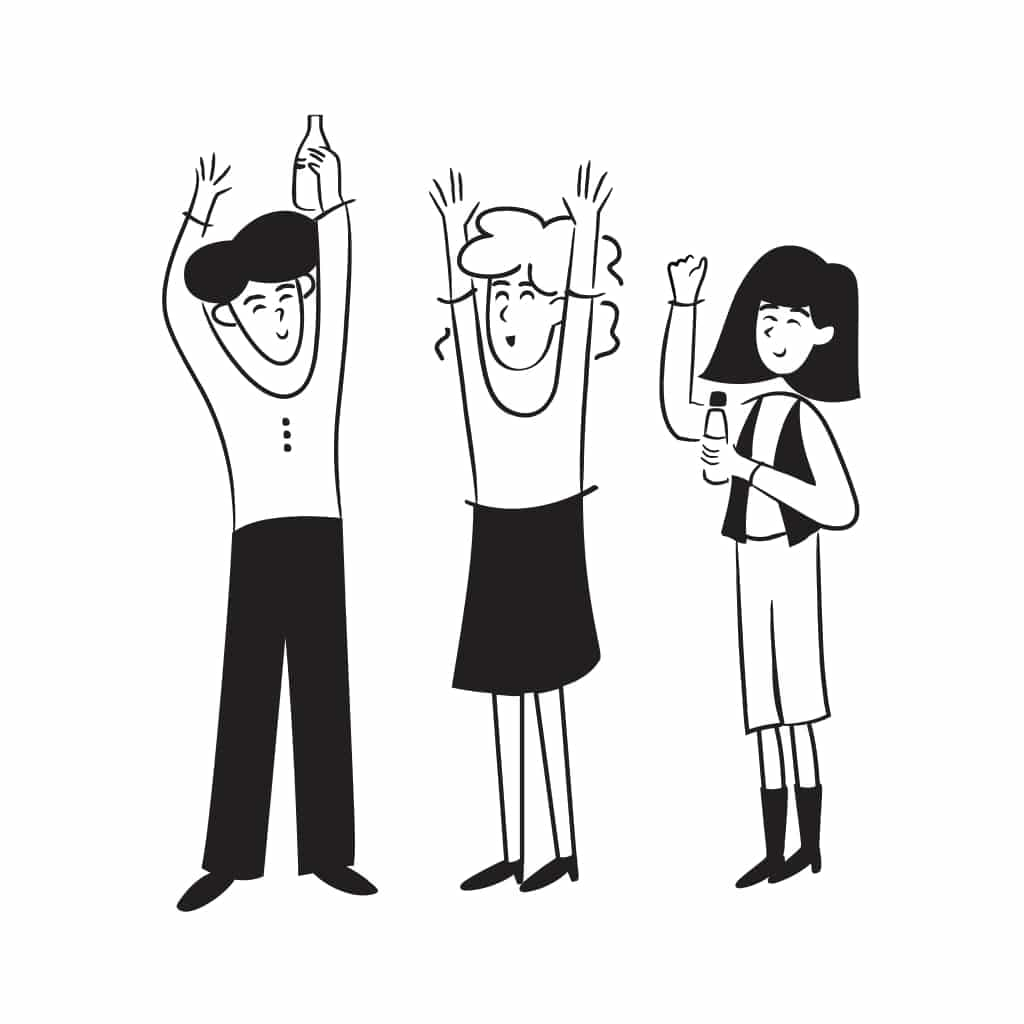This story was designed to help you learn Spanish in context, strengthen comprehension, and absorb vocabulary and grammar naturally through reading, listening, and interactive exercises. It includes a quizz, flashcards, and a writing practice to reinforce your skills. Here's how to maximize your learning:
- Listen and read the story
Play the audio while reading to follow the story naturally. Focus on understanding the main ideas and how the language sounds. The goal is to develop your Spanish listening skills and overall comprehension. - Read again with the translation
Turn on the translation and compare how ideas are expressed in Spanish and English. This builds awareness of Spanish sentence structure and grammar in real use. - Explore the key vocabulary
Below the story, you’ll find important words bolded and listed. This Spanish vocabulary list highlights key words and expressions in context and helps you understand what matters most in the story. - Take the comprehension quiz
Now test your understanding with the quiz. It reinforces the main ideas and helps improve your Spanish reading comprehension with instant feedback. - Review key vocabulary with flashcards
Use the flashcards to practice the vocabulary you just learned. This boosts memory through active recall and strengthens Spanish vocabulary retention. - Try the writing practice
Respond to the writing question related to the story. Use the new words and grammar to create your own sentences. This strengthens grammar and encourages you to think in Spanish. - Practice speaking out loud
Try saying full sentences out loud — or even read the whole story aloud if you feel ready. You can also speak along with the audio, matching the narrator’s voice as closely as possible. This is a great way to improve pronunciation and fluency while building your Spanish speaking confidence. - Review as needed
Come back to the story anytime to review vocabulary, grammar, or anything you found challenging. You can retake the quiz, replay the audio, or go through the flashcards again. Regular review helps reinforce what you’ve learned and build stronger Spanish skills over time.
Key Spanish concepts you'll encounter in this story
Grammar: Simple present tense, past tense expressions, future tense
Vocabulary: Daily life and expenses, legal and inheritance terminology, emotions and reactions
Skills: Reading dialogue, understanding sequence of events, recognizing expressions of surprise and concern
Spanish version
Alejandra trabaja como cajera en un supermercado de Cádiz.
Ella vive sola en un pequeño apartamento.
Cada mes es difícil.
El alquiler es caro y las facturas también.
Después de pagar todo, tiene muy poco dinero para comida.
Un martes por la mañana, el cartero trae una carta.
Es de un abogado.
La carta dice que debe visitar al abogado Ramírez pronto.
Cuando llega a la oficina, el abogado la saluda con una sonrisa.
—Señorita Alejandra, tengo noticias importantes. La prima de su abuela Rosa, Elena Martínez, ha muerto el mes pasado.
Alejandra está confundida.
—No conozco a ninguna Elena. Nunca he oído hablar de ella.
—Es normal. Ella vivía en Argentina desde joven. Pero lo importante es que usted es su única heredera.
—¿Heredera? ¿De qué?
—De una fortuna: 297 millones de euros.
Los ojos de Alejandra se abren mucho.
—¿Está seguro? ¿No es un error?
—Totalmente seguro —dice el abogado mostrando unos papeles—. Tengo todos los documentos aquí.
Alejandra empieza a saltar de alegría.
—¡No puedo creerlo! ¡Podré dejar mi trabajo! ¡Compraré una casa grande! ¡Viajaré por el mundo!
—Señorita —interrumpe el abogado—, hay una condición en el testamento.
Alejandra se detiene.
—¿Qué condición?
—Debe adoptar a Roco, el perro de la señora Elena. Era muy importante para ella.
Alejandra pone cara triste.
—Pero no me gustan los perros. Nunca he tenido uno. Me dan miedo.
—Entiendo —dice el abogado guardando los papeles—. En ese caso, el dinero irá a una organización de animales en Buenos Aires. Ellos cuidarán de Roco y ayudarán a muchos animales.
Alejandra cambia su expresión rápidamente.
—¡No, no! ¡Era una broma, señor Ramírez! ¡Me encantan los perros! Siempre he querido tener uno.
Spanish story with English translation
Alejandra trabaja como cajera en un supermercado de Cádiz.
Alejandra works as a cashier in a supermarket in Cádiz.
Ella vive sola en un pequeño apartamento.
She lives alone in a small apartment.
Cada mes es difícil.
Every month is difficult.
El alquiler es caro y las facturas también.
The rent is expensive and the bills too.
Después de pagar todo, tiene muy poco dinero para comida.
After paying everything, she has very little money for food.
Un martes por la mañana, el cartero trae una carta.
On Tuesday morning, the mailman brings a letter.
Es de un abogado.
It's from a lawyer.
La carta dice que debe visitar al abogado Ramírez pronto.
The letter says she must visit lawyer Ramírez soon.
Cuando llega a la oficina, el abogado la saluda con una sonrisa.
When she arrives at the office, the lawyer greets her with a smile.
—Señorita Alejandra, tengo noticias importantes. La prima de su abuela Rosa, Elena Martínez, ha muerto el mes pasado.
"Miss Alejandra, I have important news. Your grandmother Rosa's cousin, Elena Martínez, died last month."
Alejandra está confundida.
Alejandra is confused.
—No conozco a ninguna Elena. Nunca he oído hablar de ella.
"I don't know any Elena. I have never heard of her."
—Es normal. Ella vivía en Argentina desde joven. Pero lo importante es que usted es su única heredera.
"It's normal. She lived in Argentina since she was young. But the important thing is that you are her only heir."
—¿Heredera? ¿De qué?
"Heir? Of what?"
—De una fortuna: 297 millones de euros.
"Of a fortune: 297 million euros."
Los ojos de Alejandra se abren mucho.
Alejandra's eyes open wide.
—¿Está seguro? ¿No es un error?
"Are you sure? Isn't it a mistake?"
—Totalmente seguro —dice el abogado mostrando unos papeles—. Tengo todos los documentos aquí.
"Completely sure," says the lawyer showing some papers. "I have all the documents here."
Alejandra empieza a saltar de alegría.
Alejandra begins to jump with joy.
—¡No puedo creerlo! ¡Podré dejar mi trabajo! ¡Compraré una casa grande! ¡Viajaré por el mundo!
"I can't believe it! I'll be able to quit my job! I'll buy a big house! I'll travel around the world!"
—Señorita —interrumpe el abogado—, hay una condición en el testamento.
"Miss," interrupts the lawyer, "there is a condition in the will."
Alejandra se detiene.
Alejandra stops.
—¿Qué condición?
"What condition?"
—Debe adoptar a Roco, el perro de la señora Elena. Era muy importante para ella.
"You must adopt Roco, Mrs. Elena's dog. He was very important to her."
Alejandra pone cara triste.
Alejandra makes a sad face.
—Pero no me gustan los perros. Nunca he tenido uno. Me dan miedo.
"But I don't like dogs. I've never had one. They scare me."
—Entiendo —dice el abogado guardando los papeles—. En ese caso, el dinero irá a una organización de animales en Buenos Aires. Ellos cuidarán de Roco y ayudarán a muchos animales.
"I understand," says the lawyer putting away the papers. "In that case, the money will go to an animal organization in Buenos Aires. They will take care of Roco and help many animals."
Alejandra cambia su expresión rápidamente.
Alejandra changes her expression quickly.
—¡No, no! ¡Era una broma, señor Ramírez! ¡Me encantan los perros! Siempre he querido tener uno.
"No, no! It was a joke, Mr. Ramírez! I love dogs! I've always wanted to have one."
Master A1 Spanish with 120+ stories
Start using Spanish in real life with our complete story-based course.
Join the waitlist for exclusive early-bird pricing.
Join waitlist



























Comments section for language learners